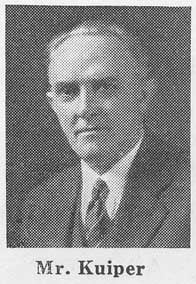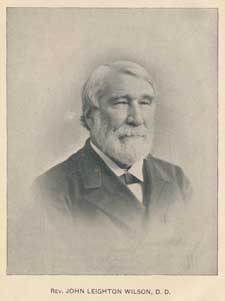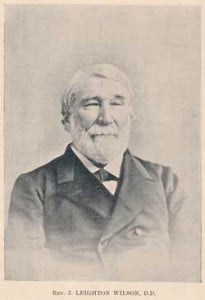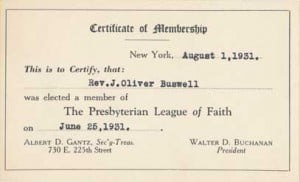A Christian of Exceptional Personality and Evangelistic Appeal
Charles Woodbridge, born January 24, 1902, was described by his fellow Reformed Christians as being no ordinary General Secretary. From his heritage as the fifteenth generation minister of his family line, dating back to 1493, from his own father who had been a missionary in China, from the fact that he married the daughter of a missionary, Charles Woodbridge would be known as “a man of exceptional personality and evangelistic appeal.” His spiritual gifts made him the perfect architect of a new mission strategy in reaching the world for Christ.
Yet the main line denomination of which he was a part, did not take kindly to this new mission upstart. Within a year, steps were taken to force him to abandon this new missions work, and when he chose not to follow their directives, Charles Woodbridge was censured by the church. He left in 1937 to become a pastor of the Presbyterian Church in North Carolina for several years.
Eventually, he served as a theological seminary professor and author, always seeking to warn Christians of the danger of compromising the Word of God. He died not all that many years ago, on 16 July 1995, at the age of 93.
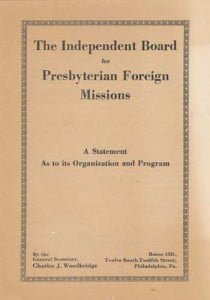 As the General Secretary of the Independent Board, Rev. Woodbridge composed, on behalf of the Independent Board, a “Statement as to Its Organization and Program.” The text that follows is a portion of that Statement:—
As the General Secretary of the Independent Board, Rev. Woodbridge composed, on behalf of the Independent Board, a “Statement as to Its Organization and Program.” The text that follows is a portion of that Statement:—
The Independent Board for Presbyterian Foreign Missions
The Independent Board for Presbyterian Foreign Missions is an agency established for the quickening of missionary zeal and the promotion of truly Biblical and truly Presbyterian foreign missions throughout the world.
It is independent in that it is not responsible, as an organization, to the General Assembly of the Presbyterian Church in the U. S. A., or to any other ecclesiastical body.
* * * *
Why Was the Independent Board Established?
Because a great many loyal Presbyterians have lost faith in the official Board of the largest of the Presbyterian churches, which is the Presbyterian Church in the U. S. A. They cannot in good conscience support an organization which they regard as disloyal to the Word of God; but they are more eager than ever, in view of the growing apostasy throughout the world, to further the cause of Biblical foreign missions to the uttermost ends of the earth.
Why have so many persons lost confidence in the official Board? Because in the last few years the Board, in its official actions, has been compromising with error in a most distressing way.
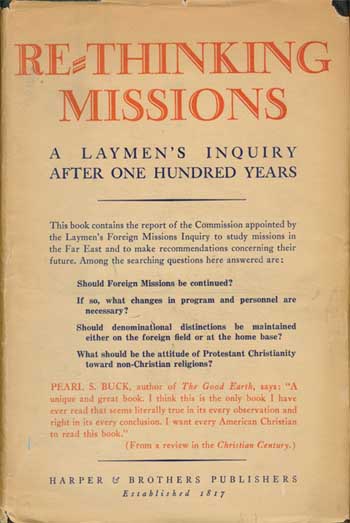 When the Laymen’s Appraisal Commission’s Report was issued last year, an attack against the very heart of the Christian message, the Board, instead of swiftly, directly, and uncompromisingly repudiating the Report, answered it in terms which were most vague and unsatisfactory.
When the Laymen’s Appraisal Commission’s Report was issued last year, an attack against the very heart of the Christian message, the Board, instead of swiftly, directly, and uncompromisingly repudiating the Report, answered it in terms which were most vague and unsatisfactory.
When Pearl Buck offered her resignation to the PCUSA Board of Missions, it was accepted by the Board “with regret,” commending her work in China.
[At right, if you can’t make out the dust-jacket blurb by Pearl Buck, it says, in part, “… I think this is the only book I have ever read that seems literally true in its every observation and right in its every conclusion…” — The effrontery of Mrs. Buck’s statement is impossible to miss. By itself it is proof that the concerns of orthodox Christians were not misplaced.]
Some of the Modernist institutions in China which the Board helps to support are: the “Church of Christ in China”, controlled by Modernists, in opposition to which a large group of conservative Christians organized the Bible Union of China; the National Christian Council of China, in whose Bulletin one may read extracts which make the true Christian shudder — for example, in one of its articles, Sun Yat Sen, Lenin and Jesus Christ are treated as figures of comparable grandeur; the Christian Literature Society of China, where Modernist books are often printed; Yencheng University, a hotbed of “liberal” thought; these institutions, all destructive of Biblical Christianity, the Board of Foreign Missions of the Presbyterian Church in the U. S. A. helps to maintain.
At the meeting of the General Assembly in May, 1933, an attempt was made to remedy the situation through ecclesiastical action.
An Overture was presented to the Assembly which, if passed, would have been a real step toward the purification of the Board of Foreign Missions. A document of 110 pages was written in support of the Overture. This document is entitled “Modernism and the Board of Foreign Missions of the Presbyterian Church in the U. S. A.” by Dr. J. Gresham Machen, and may be had upon request to the office of the General Secretary. In a clear, logical way the author of this pamphlet marshalled his facts. He proved that the Board of Foreign Missions had been temporising in its attitude toward Modernism.
Instead of attempting to answer this document—and there was no satisfactory answer other than the entire reformation of the Board—the Board evaded the issue.
Instead of replying to the specific accusations which were levelled in black and white against its policies—accusations which to this day have never been disproved—The Board took refuge behind the career, character and personality of one of its leading secretaries, rallied the Assembly to the defense of a man, and, in the popular enthusiasm which was evoked, the Overture was lost.
—∞—
Thus some of the events which led up to the formation of the Independent Board for Presbyterian Foreign Missions. Dr. Woodbridge served as General Secretary of the IBPFM and also as the editor of the Independent Board Bulletin, from March 1935-June 1937. Some of his more important publications through the remainder of his life included the following:
1935 – “The Social Gospel: A Review of the Current Mission Study Text Books Recommended for Adults by the Board of Foreign Missions, Presbyterian Church, U.S.A.,” Christianity Today 5.9 (February 1935): 209-211.
1937 – “Why I Have Resigned as General Secretary of the Independent Board,” The Presbyterian Guardian 4.5 (12 June 1937): 69-71. Available here.
1945 – The Chronicle of Salimbene of Parma: A Thirteenth Century Christian Synthesis. Durham, NC: Duke University, Ph.D. dissertation, 305 p.
1947 – Standing on the Promises: Rich Truths from the Book of Acts.
1953 – A Handbook of Christian Truth, co-authored with Harold Lindsell.
1953 – Romans: The Epistle of Grace.
1962 – Bible Prophecy.
1969 – The New Evangelicalism.
Image sources:
• News clipping [publisher not known] from the Henry G. Welbon Manuscript Collection, Scrapbook no. 1, page 34.
• Cover of The Independent Board for Presbyterian Foreign Missions: A Statement As to its Organization and Program, by Charles J. Woodbridge. (1934)
• Dust-jacket of Re-Thinking Missions: A Laymen’s Inquiry After One Hundred Years. New York: Harper & Brothers Publishers, 1932.


